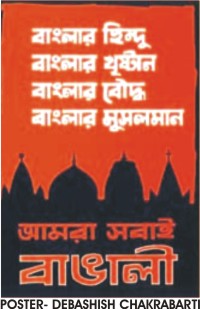Perception
Victory Day 2010: Looking Back to Look Forward
 |
Photo: Kishor Parekh |
Asrar Chowdhury
Shabash Bangladesh
This world looks at you amazed
Raped to the last drop of blood
And yet your head is still raised
- Sukanta Bhattacharya;
Transliteration Asrar Chowdhury
1971. 266 days. Three million lives. 7.83 lives per minute. An estimated ten million dislocated in neighbouring India. Countless victims of war crimes and crimes against humanity. This is just the human price a nation paid for her freedom to write a ten-letter word BANGLADESH on the world map.
The genocide against the innocent people of Bangladesh ranks as one of the most brutal genocides of the 20th Century alongside that of World War II. It challenged the conscience of the freedom loving people of the world. The Friends of '71 responded with whatever weapon they had to fight alongside the people of Bangladesh. With the help of all Friends of '71 and the resilience of a nation that refused to say no to the last drop of blood, Bangladesh emerged as an independent nation on 16th December 1971.
"The story of Bangladesh is an ancient one again made fresh"
- Joan Baez, 1971
After her bloody birth Bangladesh stumbled over one stone after another in her first decade. The oil shock of the '70s, the Bangladesh Famine of '74, political change through the bullet- not the ballot- in '75 and again in '81 challenged the euphoria and aspirations that '71 generated. The independence war and all its values seemed to be evaporating into the ether.
Henry Kissinger's 1974 remark that Bangladesh is a "basket case" seemed to be becoming ever so true by the end of '70s. There was not much to show in the basket that by then appeared to have too many holes in it. The economists Just Faaland and J Parkinson in their 1975 treatise Bangladesh: The Test Case for Development argued, "If Bangladesh could attain development there would be no country without it [development]".The problem with Kissinger as a political analyst; and Faaland and Parkinson as economists is their ignorance of history and observing the Bangladesh experience over a very short time span. Bangladesh [and Bengal] has a very rich history of struggles against oppression. Social changes can sometimes take decades even centuries to happen. When the Sun of Bengal set in 1757 giving rise to a never setting Sun of the British Empire, darkness overshadowed this region for more than two centuries. It took 214 years from 1757 to 1971 for the Sun to rise in the Eastern Horizon of Bangladesh again. In between there were many independence struggles. The Indian Statesman Gopalakrishna Gokhale rightly observed and appreciated the historical potential of this region and defined Bengal in his immortal statement, "What Bengal thinks today India thinks tomorrow". The beginning of the third decade of Bangladesh- the nineties of the 20th century- ushered in a new dawn for Bangladesh- the road to institutionalised democracy.
- The answer my friend, is blowing in the wind
- Bob Dylan at Concert for Bangladesh, 1971
2010.
Bangladesh completes 39 years of Victory Day celebrations and enters her fifth decade as an independent nation. It is now time to look back and prove the critiques of critics incorrect. Stop to wonder and ponder.
Since 1991 Bangladesh has slowly and steadily cemented the institutional foundations of parliamentary democracy. Critics can argue things could have been better. They are 'partially' correct when they say so. What critics often fail to observe is, in South Asia- after India- Bangladesh has the longest surviving practice of parliamentary democracy. Bangladesh is one of the few States in the world that has a very homogenous configuration in language and ethnic background.
 There was a time when the population density of Bangladesh was described as if all the people in the world could be taken and put into the USA, the population density would still be less than that of Bangladesh. This is true. This is also a statistical data where statistics can be a deceiving white lie. This large population and its high density have made Bangladesh one of the most lucrative markets for mobile telecommunication. In the last four decades, in all her ups and downs, Bangladesh has one of the best road-connectivity in South Asia. There was a time when the population density of Bangladesh was described as if all the people in the world could be taken and put into the USA, the population density would still be less than that of Bangladesh. This is true. This is also a statistical data where statistics can be a deceiving white lie. This large population and its high density have made Bangladesh one of the most lucrative markets for mobile telecommunication. In the last four decades, in all her ups and downs, Bangladesh has one of the best road-connectivity in South Asia.
At the time of independence the population of Bangladesh was more than today's Pakistan. Observe the population statistics today. Family planning in Bangladesh through State intervention and help from donor friends is a success story. An equally impressive achievement is the immunization programmes that have reduced child mortality rates. A fertile land blessed by the waters of the Ganges-Brahmaputra delta somehow has never lead to serious food crises. However. The real potential of Bangladesh does not lie in the few of the many examples narratives above. It lies in the potential of its youth.
With every mistake, we must surely be learning
- George Harrison at Concert for Bangladesh, 1971.
The youth of Bangladesh has always been potential. This youth answered the call of the time in '71. That same youth, a generation later, is powering the wheels of the economy in the RMG sector. They are remitting their hard saved money back home. The youth is proudly carrying the national flag as one of the most successful armed forces in the UN Peace Missions.
Every year thousands of potential graduates enter the labour market. These graduates have the potential to contribute in new avenues like book publishing, call centres, the software industry, the hospitality industry, the medical industry and many other avenues that have not been properly explored yet. The uneducated population also has the potential to contribute to the wheels of the economy if they could be trained in languages such as Arabic for the Middle Eastern labour market. The labour force going to the Middle East could find better jobs and fill in the gap between skilled and unskilled jobs of that region. Training in more languages can help the ever-potential youth of Bangladesh explore labour markets such as the French and Spanish speaking nations.
YES. Bangladesh has problems and setbacks. Which country doesn't? After all the hiccups over the last four decades, today, Bangladesh foresees herself to become a middle-income country within the next decade or so. Henry Kissinger in 2008 declined to comment on his 1974 remark that Bangladesh is a 'basket case' a bottomless basket. Faaland and Parkinson made a u-turn on their 1975 remarks in a 2007 statement saying, "with three decades and more of experience of limited and chequered progress, sustainable development in Bangladesh appears to us within reach".
Here comes the Sun
- George Harrison at Concert for Bangladesh, 1971
Who will carry Bangladesh forward in the 21st Century? It will certainly be her youth. Fateh Ali Chowdhury, freedom fighter of Crack Platoon, told this author for the Daily Star during Victory Day, 2008, "Very few nations have the privilege of fighting a War of Independence". The youth of yesteryears played their role in '71 and other freedom struggles in the history of this region. It is now the responsibility of today's youth to take Bangladesh forward to her rightful place on the world stage.
National days like Victory Day are like the floods of Bangladesh. They come with a powerful message that reminds us of the rich history and heritage of this wonderful country. Like the floods they go away fertilising the soil from the waters of the Ganges-Brahmaputra delta. We revisit history to make our journey forward worthwhile. In four decades Bangladesh has come a long way to make a launch towards becoming a middle-income country. And that can only be possible if the youth of today responds to the needs of the moment. As Bangladesh enters her fifth decade as an independent nation- Generation Next takes Bangladesh forward. The mantle now rests on your shoulders. It no longer belongs to us, or those before us. Shubho Bijoy Dibosh.
(The writer teaches economic theory at Jahangirnagar University and North South University)
Acknowledgements:
1. Beneath the Surface: Development Issues Bangladesh and Beyond, forthcoming, by Abdul Bayes of Jahangirnagar University.
2. Hasan Masood, actor and photographer.
| 